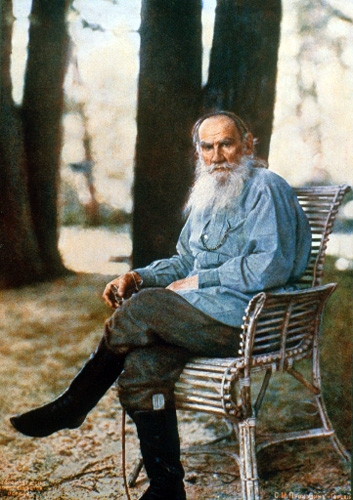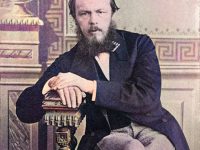
Leo Tolstoy, Foto: Prokudin-Gorski (1908)
On September 9, 1828, Russian writer Count Lyov (also Lev) Nikolayevich Tolstoy, usually referred to in English as Leo Tolstoy, was born. Tolstoy is considered one of the greatest authors of all times. His main works War and Peace and Anna Karenina are classics of the realistic novel.
“All happy families resemble one another, each unhappy family is unhappy in its own way.”
— Leo Tolstoy, Anna Karenina (1875-1877), first sentence
Family Background and Youth
Lev Tolstoy was descended from the Russian noble Tolstoy family. He was the fourth of five children. His father was the Russian count Nikolai Iljitsch Tolstoi (1794-1837), his mother Marija Nikolajewna, née Princess Wolkonskaja (1790-1830). When he became an orphan at the age of nine, his father’s sister took over the guardianship. He began studying oriental languages at the University of Kazan in 1844. After a change to the law faculty, he discontinued his studies in 1847 in order to improve the situation of the 350 inherited serfs in the family estate in Yasnaya Polyana with land reforms. According to other sources, in 1848 he passed the legal candidate examination at the University of St. Petersburg “with scant need” and then returned to his village.
Military Service
From 1851 on he experienced the war in the Caucasus in the tsarist army as ensign of an artillery brigade. His experiences in military operations influenced his early Caucasus narratives (The Woodcut, The Attack, The Cossacks). After the outbreak of the Crimean War in 1854, he experienced a war of positions in the besieged fortress of Sevastopol. The realistic reports from this war (1855: Sevastopol narratives) made him known as a writer at an early age.
Reformer of Education
From 1855 he lived alternately on the Yasnaya Polyana estate, in Moscow and in Saint Petersburg. From an educational point of view he travelled through Western European countries in 1857 and 1860/61 and visited artists (Charles Dickens,[2] Ivan Sergeyevich Turgenev) and pedagogues (Adolph Diesterweg). After his return he intensified his reform pedagogical efforts and established village schools according to the model of Rousseau.[1] He wrote reading books containing narratives on history, physics, biology and religion to convey moral and social values to children. Until the 1920s, generations of Russian children also received their primary education with his textbook Alphabet, first published in 1872.
Literary Fame
In 1862 Tolstoy married 18-year-old Sofja Andrejewna Behrs of German descent, with whom he had a total of 13 children. In the following years he wrote the monumental novels War and Peace (1862-1869) and Anna Karenina (1873-1878), which established his literary fame. In his diary in the mid-1850s, he noted: “There is something I love more than good: fame.“
“If one has no vanity in this life of ours, there is no sufficient reason for living.”
— Leo Tolstoy, The Kreutzer Sonnata (1889)
War and Peace
War and Peace is regarded as one of the most important works of world literature and has been filmed several times. In its mixture of historical novel and military-political representations as well as analyses of the tsarist feudal society during the Napoleonic era at the beginning of the 19th century in Russia and the French invasion between 1805 and 1812, it anticipates the montage technique of modern novels of the 20th century. The design was completed in 1863 and its first part was published two years later in the journal Russkiy Vestnik under the title 1805 in series. Further parts followed until 1867. From 1866 to 1869 Tolstoy rewrote the novel and among other things changed the ending. This version was published in 1868/69 under the title War and Peace in Moscow.
A Phase of Disorientation
With his great recognition, Tolstoy began a phase of disorientation. He felt “on the edge“. As a participant in the 1882 Moscow census, he perceived a misery among the workers that exceeded that of the peasants. Deeply shaken, he tried to counter the rural exodus by organizing aid for farmers affected by crop failures. His quest for meaning extended to more and more areas. So he renounced smoking, alcohol and hunting (“cruel pleasures”). He fed himself vegetarian and declared that man would have to give up meat food if he wanted to develop morally, “because apart from the excitement of passions resulting from this food, it is also quite simply immoral because it requires an act contrary to the feeling of morality – murder – and because it is required only by gourmetism and voraciousness“. Since 1881 he had turned intensively to religious questions. In a series of conversations with leading clergymen such as the Metropolitan of Moscow and on journeys to various churches and monasteries he developed an aversion to the ritual form of religiosity he encountered.
Rising Conflicts and Death
His respect abroad was followed by his ostracism at home. He was subject to police surveillance since 1882. My confession as well as what my faith consists in were immediately forbidden with their publication. He was even the subject of a rumor that he was mentally disturbed. Tolstoy rejected socialist aspirations in the sense of a dictatorship of the proletariat: “So far the capitalists have ruled, then workers functionaries would rule”. With his moral rigorism he saw himself in a dilemma: he accused himself and the rich upper class from which he came of an egocentric and meaningless way of life. His attitude led him to the question of enduring moral values, which he answered by claiming unconditional charity and radical non-violence. In addition to state arbitrary measures such as the house search of 1908, during which all texts found were confiscated, family conflicts also intensified. Since his wife refused to regard the literary works bequeathed to the Russian people in his will as common possessions of the people, Tolstoy, his doctor and his youngest daughter left the family for a final, spectacular journey south. On this journey in an open train he fell ill with pneumonia and died in the early morning of 20 November 1910 in the house of the stationmaster of Astapowo at age 82.
Eelco Runia – Leo Tolstoy’s War and Peace and the Theory of History, December 18, 2013.[4]
References and Further Reading:
- [1] “Man was born free, and he is everywhere in chains” – Jean-Jacques Rousseau, SciHi Blog
- [2] Charles Dickens – Famous Writer and Critic of the Victorian Era, SciHi blog
- [3] Works of or about Leo Tolstoy via Wikisource
- [4] Eelco Runia – Leo Tolstoy’s War and Peace and the Theory of History, December 18, 2013. “Slavic literatures in dialogical view”, University of Göttingen @ youtube
- [5] Works by or about Leo Tolstoy at Internet Archive
- [6] Newspaper clippings about Leo Tolstoy in the 20th Century Press Archives of the ZBW
- [7] Lednicki, Waclaw (April 1947). “Tolstoy through American eyes”. The Slavonic and East European Review. 25 (65).
- [8] Leo Tolstoi at Wikidata
- [9] Craraft, James. Two Shining Souls: Jane Addams, Leo Tolstoy, and the Quest for Global Peace (Lanham: Lexington, 2012)
- [10] Doyle, Arthur Conan (January 1898). My Favourite Novelist and His Best Book. London.
- [11] Boer, Roland (2014). “Lenin on Tolstoy: Between Imaginary Resolution and Revolutionary Christian Communism”. Science & Society. 78 (1): 41–60.
- [12] Lednicki, Waclaw (April 1947). “Tolstoy through American eyes”. The Slavonic and East European Review. 25 (65).
- [13] Leon, Derrick (1944). Tolstoy His Life and Work. London: Routledge.
- [14] Timeline for Leo Tolstoi, via Wikidata




